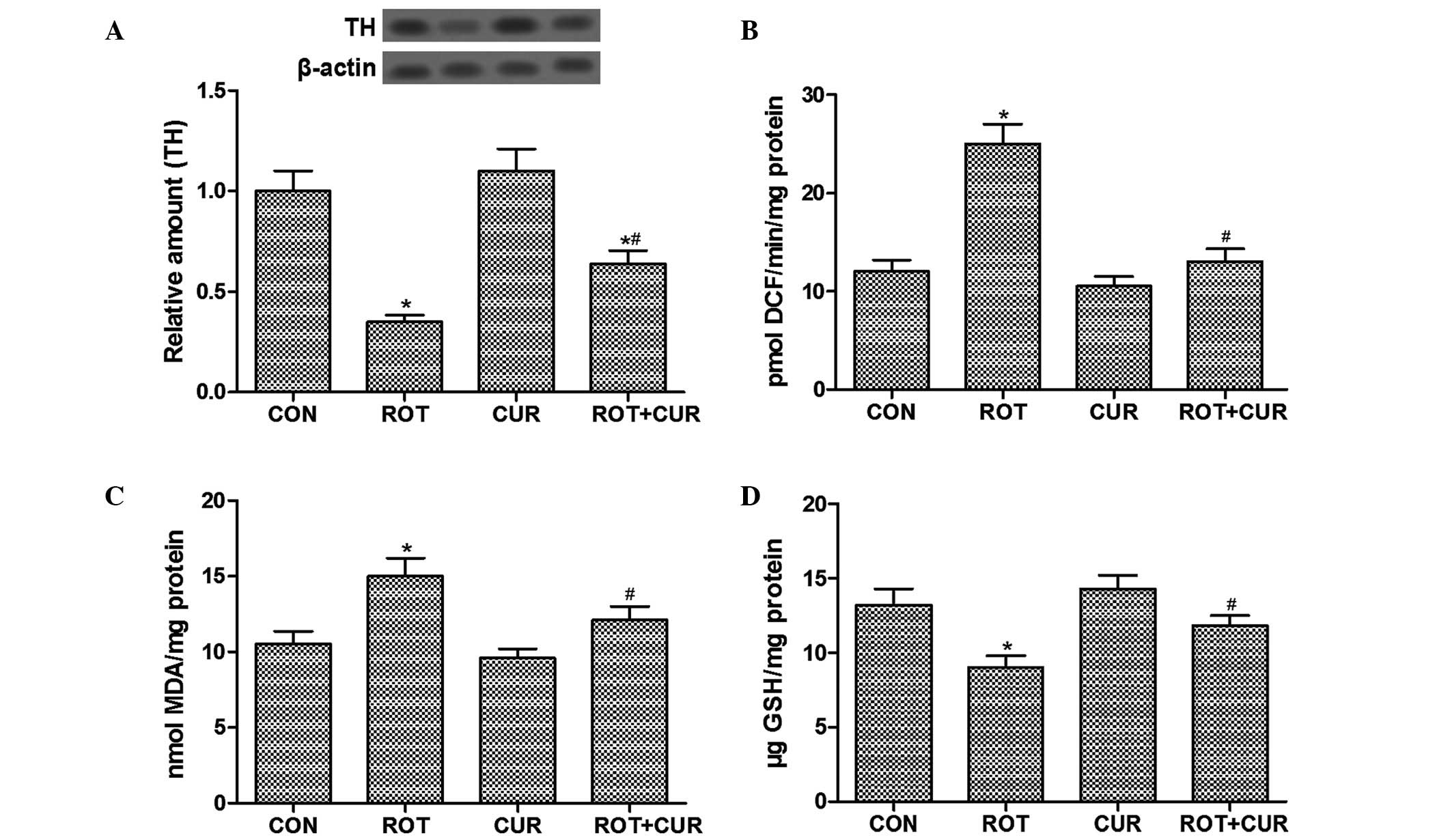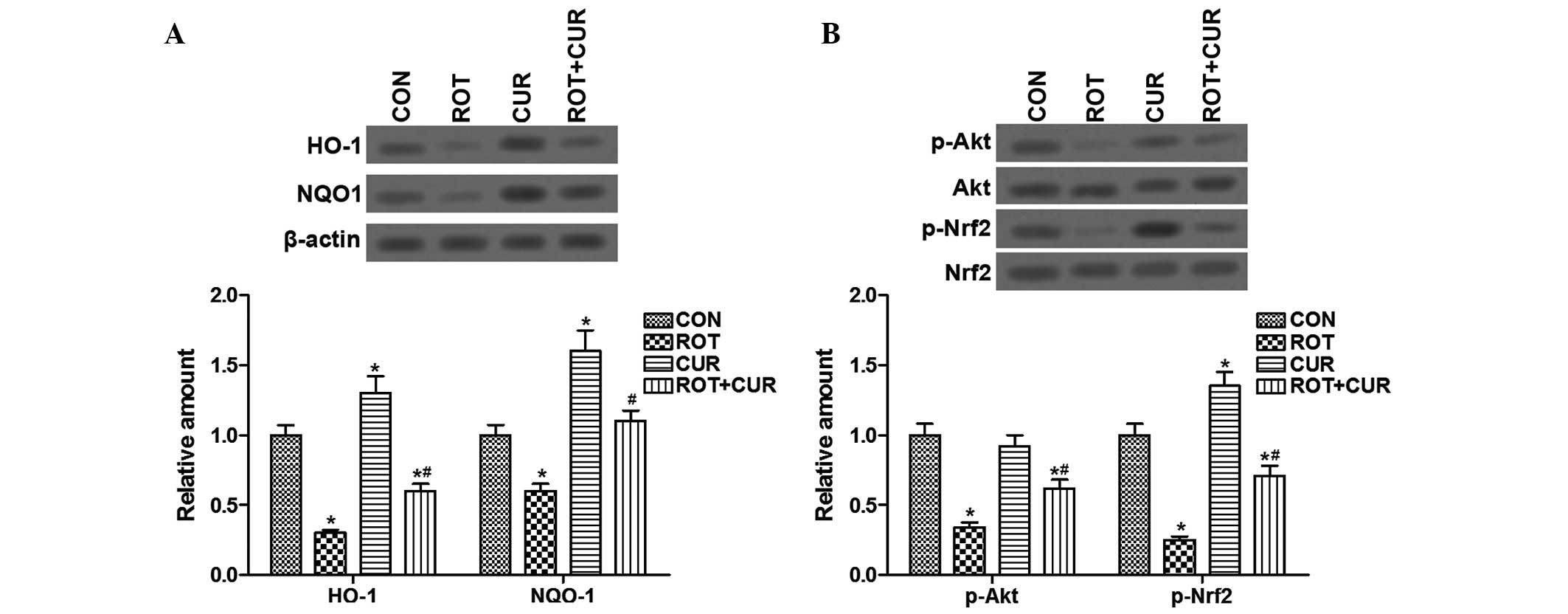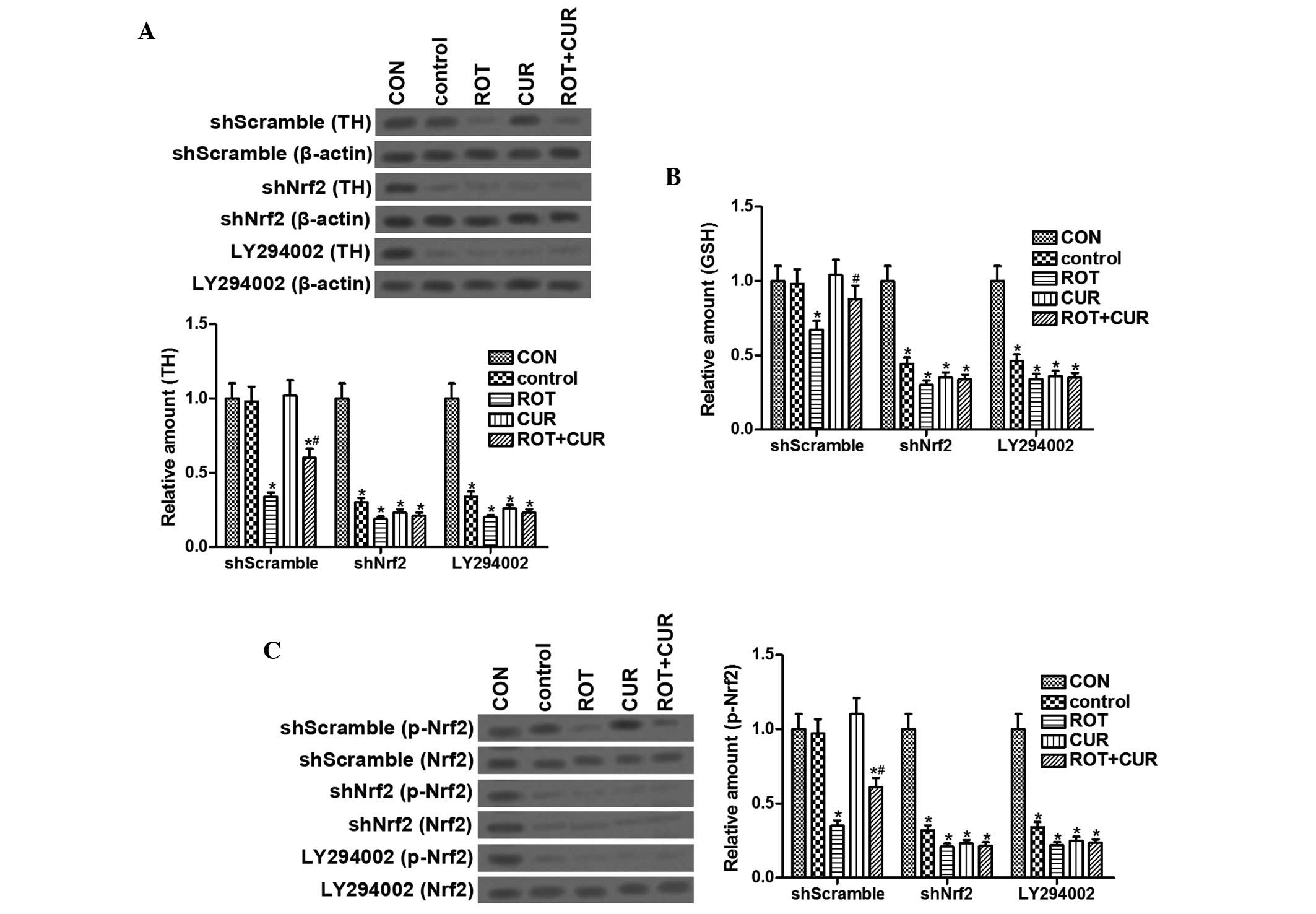|
1
|
Nutt JG and Wooten GF: Clinical practice.
Diagnosis and initial management of Parkinson's disease. N Engl J
Med. 353:1021–1027. 2005. View Article : Google Scholar : PubMed/NCBI
|
|
2
|
Camilleri A and Vassallo N: The centrality
of mitochondria in the pathogenesis and treatment of parkinson's
disease. CNS Neurosci Ther. 20:591–602. 2014. View Article : Google Scholar : PubMed/NCBI
|
|
3
|
Mariani E, Polidori MC, Cherubini A and
Mecocci P: Oxidative stress in brain aging, neurodegenerative and
vascular diseases: An overview. J Chromatogr B Analyt Technol
Biomed Life Sci. 827:65–75. 2005. View Article : Google Scholar : PubMed/NCBI
|
|
4
|
Tolleson CM and Fang JY: Advances in the
mechanisms of Parkinson's disease. Discov Med. 15:61–66.
2013.PubMed/NCBI
|
|
5
|
Sayre LM, Smith MA and Perry G: Chemistry
and biochemistry of oxidative stress in neurodegenerative disease.
Curr Med Chem. 8:721–738. 2001. View Article : Google Scholar : PubMed/NCBI
|
|
6
|
Perry TL and Yong VW: Idiopathic
Parkinson's disease, progressive supranuclear palsy and glutathione
metabolism in the substantia nigra of patients. Neurosci Lett.
67:269–274. 1986. View Article : Google Scholar : PubMed/NCBI
|
|
7
|
Bharath S, Hsu M, Kaur D, Rajagopalan S
and Andersen JK: Glutathione, iron and Parkinson's disease. Biochem
Pharmacol. 64:1037–1048. 2002. View Article : Google Scholar : PubMed/NCBI
|
|
8
|
Saravanan KS, Sindhu KM, Senthilkumar KS
and Mohanakumar KP: L-deprenyl protects against rotenone-induced,
oxidative stress-mediated dopaminergic neurodegeneration in rats.
Neurochem Int. 49:28–40. 2006. View Article : Google Scholar : PubMed/NCBI
|
|
9
|
Du XX, Xu HM, Jiang H, Song N, Wang J and
Xie JX: Curcumin protects nigral dopaminergic neurons by
iron-chelation in the 6-hydroxydopamine rat model of Parkinson's
disease. Neurosci Bull. 28:253–258. 2012. View Article : Google Scholar : PubMed/NCBI
|
|
10
|
Mythri RB and Bharath MM: Curcumin: A
potential neuroprotective agent in Parkinson's disease. Curr Pharm
Des. 18:91–99. 2012. View Article : Google Scholar : PubMed/NCBI
|
|
11
|
Dutta S, Padhye S, Priyadarsini KI and
Newton C: Antioxidant and antiproliferative activity of curcumin
semicarbazone. Bioorg Med Chem Lett. 15:2738–2744. 2005. View Article : Google Scholar : PubMed/NCBI
|
|
12
|
Biswas SK, McClure D, Jimenez LA, Megson
IL and Rahman I: Curcumin induces glutathione biosynthesis and
inhibits NF-kappaB activation and interleukin-8 release in alveolar
epithelial cells: Mechanism of free radical scavenging activity.
Antioxid Redox Signal. 7:32–41. 2005. View Article : Google Scholar : PubMed/NCBI
|
|
13
|
Singh S and Khar A: Biological effects of
curcumin and its role in cancer chemoprevention and therapy.
Anticancer Agents Med Chem. 6:259–270. 2006. View Article : Google Scholar : PubMed/NCBI
|
|
14
|
Daniel S, Limson JL, Dairam A, Watkins GM
and Daya S: Through metal binding, curcumin protects against lead-
and cadmium-induced lipid peroxidation in rat brain homogenates and
against lead-induced tissue damage in rat brain. J Inorg Biochem.
98:266–275. 2004. View Article : Google Scholar : PubMed/NCBI
|
|
15
|
Ataie A, Sabetkasaei M, Haghparast A,
Moghaddam AH and Kazeminejad B: Neuroprotective effects of the
polyphenolic antioxidant agent, Curcumin, against
homocysteine-induced cognitive impairment and oxidative stress in
the rat. Pharmacol Biochem Behav. 96:378–385. 2010. View Article : Google Scholar : PubMed/NCBI
|
|
16
|
Jagatha B, Mythri RB, Vali S and Bharath
MM: Curcumin treatment alleviates the effects of glutathione
depletion in vitro and in vivo: Therapeutic implications for
Parkinson's disease explained via in silico studies. Free Radic
Biol Med. 44:907–917. 2008. View Article : Google Scholar : PubMed/NCBI
|
|
17
|
Harish G, Venkateshappa C, Mythri RB,
Dubey SK, Mishra K, Singh N, Vali S and Bharath MM: Bioconjugates
of curcumin display improved protection against glutathione
depletion mediated oxidative stress in a dopaminergic neuronal cell
line: Implications for Parkinson's disease. Bioorg Med Chem.
18:2631–2638. 2010. View Article : Google Scholar : PubMed/NCBI
|
|
18
|
Chen J, Tang XQ, Zhi JL, Cui Y, Yu HM,
Tang EH, Sun SN, Feng JQ and Chen PX: Curcumin protects PC12 cells
against 1-methyl-4-phenylpyridinium ion-induced apoptosis by
bcl-2-mitochondria-ROS-iNOS pathway. Apoptosis. 11:943–953. 2006.
View Article : Google Scholar : PubMed/NCBI
|
|
19
|
Cui QLSS: Curcumin antagonizes
rotenone-induced injury of PC12 Cells by antioxidant activity. Acta
Med Univ Sci Technol Huazhong. 39:37–46. 2010.
|
|
20
|
Tsou YH, Shih CT, Ching CH, Huang JY, Jen
CJ, Yu L, Kuo YM, Wu FS and Chuang JI: Treadmill exercise activates
Nrf2 antioxidant system to protect the nigrostriatal dopaminergic
neurons from MPP+ toxicity. Exp Neurol. 263:50–62. 2015. View Article : Google Scholar
|
|
21
|
Lee JM and Johnson JA: An important role
of Nrf2-ARE pathway in the cellular defense mechanism. J Biochem
Mol Biol. 37:139–143. 2004. View Article : Google Scholar : PubMed/NCBI
|
|
22
|
Kakkar V and Kaur IP: Evaluating potential
of curcumin loaded solid lipid nanoparticles in aluminium induced
behavioural, biochemical and histopathological alterations in mice
brain. Food Chem Toxicol. 49:2906–2913. 2011. View Article : Google Scholar : PubMed/NCBI
|
|
23
|
Mokrasch LC and Teschke EJ: Glutathione
content of cultured cells and rodent brain regions: A specific
fluorometric assay. Anal Biochem. 140:506–509. 1984. View Article : Google Scholar : PubMed/NCBI
|
|
24
|
Shinomol GK and Muralidhara: Prophylactic
neuroprotective property of Centella asiatica against
3-nitropropionic acid induced oxidative stress and mitochondrial
dysfunctions in brain regions of prepubertal mice. Neurotoxicology.
29:948–957. 2008. View Article : Google Scholar : PubMed/NCBI
|
|
25
|
Ohkawa H, Ohishi N and Yagi K: Assay for
lipid peroxides in animal tissues by thiobarbituric acid reaction.
Anal Biochem. 95:351–358. 1979. View Article : Google Scholar : PubMed/NCBI
|
|
26
|
Lim JH, Kim KM, Kim SW, Hwang O and Choi
HJ: Bromocriptine activates NQO1 via Nrf2-PI3K/Akt signaling: Novel
cytoprotective mechanism against oxidative damage. Pharmacol Res.
57:325–331. 2008. View Article : Google Scholar : PubMed/NCBI
|
|
27
|
Lin TK, Cheng CH, Chen SD, Liou CW, Huang
CR and Chuang YC: Mitochondrial dysfunction and oxidative stress
promote apoptotic cell death in the striatum via cytochrome
c/caspase-3 signaling cascade following chronic rotenone
intoxication in rats. Int J Mol Sci. 13:8722–8739. 2012. View Article : Google Scholar : PubMed/NCBI
|
|
28
|
Coulom H and Birman S: Chronic exposure to
rotenone models sporadic Parkinson's disease in Drosophila
melanogaster. J Neurosci. 24:10993–10998. 2004. View Article : Google Scholar : PubMed/NCBI
|
|
29
|
Betarbet R, Sherer TB, MacKenzie G,
Garcia-Osuna M, Panov AV and Greenamyre JT: Chronic systemic
pesticide exposure reproduces features of Parkinson's disease. Nat
Neurosci. 3:1301–1306. 2000. View
Article : Google Scholar : PubMed/NCBI
|
|
30
|
Madathil SK, Karuppagounder SS and
Mohanakumar KP: Sodium salicylate protects against rotenone-induced
parkinsonism in rats. Synapse. 67:502–514. 2013. View Article : Google Scholar : PubMed/NCBI
|
|
31
|
Santiago RM, Barbieiro J, Lima MM,
Dombrowski PA, Andreatini R and Vital MA: Depressive-like behaviors
alterations induced by intranigral MPTP, 6-OHDA, LPS and rotenone
models of Parkinson's disease are predominantly associated with
serotonin and dopamine. Prog Neuropsychopharmacol Biol Psychiatry.
34:1104–1114. 2010. View Article : Google Scholar : PubMed/NCBI
|
|
32
|
Swarnkar S, Singh S, Mathur R, Patro IK
and Nath C: A study to correlate rotenone induced biochemical
changes and cerebral damage in brain areas with neuromuscular
coordination in rats. Toxicology. 272:17–22. 2010. View Article : Google Scholar : PubMed/NCBI
|
|
33
|
Shinomol GK and Muralidhara: Bacopa
monnieri modulates endogenous cytoplasmic and mitochondrial
oxidative markers in prepubertal mice brain. Phytomedicine.
18:317–326. 2011. View Article : Google Scholar
|
|
34
|
Madathil KS, Karuppagounder SS, Haobam R,
Varghese M, Rajamma U and Mohanakumar KP: Nitric oxide synthase
inhibitors protect against rotenone-induced, oxidative stress
mediated parkinsonism in rats. Neurochem Int. 62:674–683. 2013.
View Article : Google Scholar : PubMed/NCBI
|
|
35
|
Liu CB, Wang R, Pan HB, Ding QF and Lu FB:
Effect of lycopene on oxidative stress and behavioral deficits in
rotenone induced model of Parkinson's disease. Zhongguo Ying Yong
Sheng Li Xue Za Zhi. 29:380–384. 2013.In Chinese. PubMed/NCBI
|
|
36
|
Zhang Q, Zhang J, Jiang C, Qin J, Ke K and
Ding F: Involvement of ERK1/2 pathway in neuroprotective effects of
pyrroloquinoline quinine against rotenone-induced SH-SY5Y cell
injury. Neuroscience. 270:183–191. 2014. View Article : Google Scholar : PubMed/NCBI
|
|
37
|
Nguyen T, Sherratt PJ and Pickett CB:
Regulatory mechanisms controlling gene expression mediated by the
antioxidant response element. Annu Rev Pharmacol Toxicol.
43:233–260. 2003. View Article : Google Scholar
|
|
38
|
Wu J, Li Q, Wang X, Yu S, Li L, Wu X, Chen
Y, Zhao J and Zhao Y: Neuroprotection by curcumin in ischemic brain
injury involves the Akt/Nrf2 pathway. PLoS One. 8:e598432013.
View Article : Google Scholar : PubMed/NCBI
|
|
39
|
Qin XY, Cheng Y and Yu LC: Potential
protection of curcumin against intracellular amyloid beta-induced
toxicity in cultured rat prefrontal cortical neurons. Neurosci
Lett. 480:21–24. 2010. View Article : Google Scholar : PubMed/NCBI
|
|
40
|
Dickinson DA, Iles KE, Zhang H, Blank V
and Forman HJ: Curcumin alters EpRE and AP-1 binding complexes and
elevates glutamate-cysteine ligase gene expression. FASEB J.
17:473–475. 2003.PubMed/NCBI
|
|
41
|
Gao S, Duan X, Wang X, Dong D, Liu D, Li
X, Sun G and Li B: Curcumin attenuates arsenic-induced hepatic
injuries and oxidative stress in experimental mice through
activation of Nrf2 pathway, promotion of arsenic methylation and
urinary excretion. Food Chem Toxicol. 59:739–747. 2013. View Article : Google Scholar : PubMed/NCBI
|


















